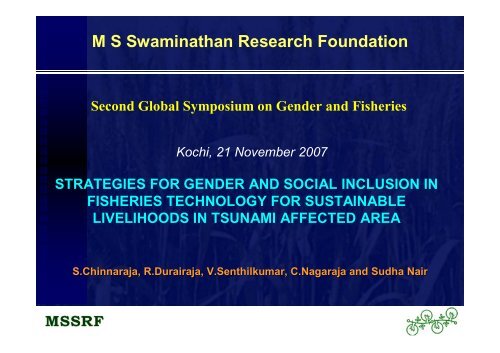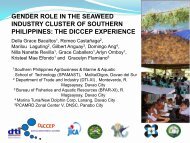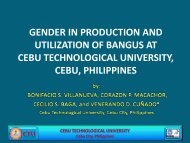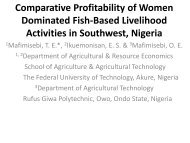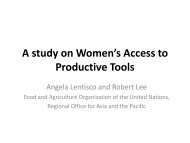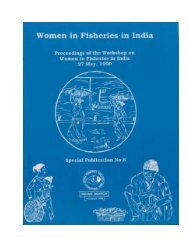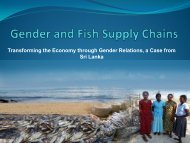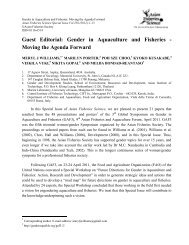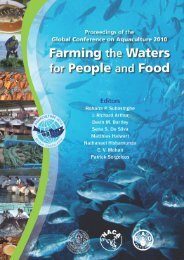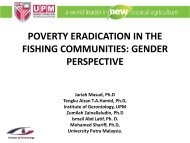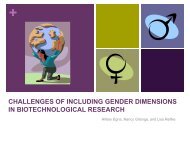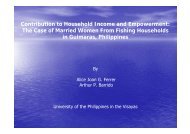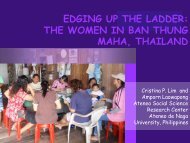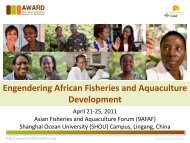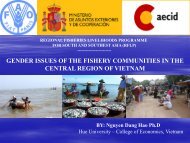M S Swaminathan Research Foundation - GENDER IN ...
M S Swaminathan Research Foundation - GENDER IN ...
M S Swaminathan Research Foundation - GENDER IN ...
Create successful ePaper yourself
Turn your PDF publications into a flip-book with our unique Google optimized e-Paper software.
M S <strong>Swaminathan</strong> <strong>Research</strong> <strong>Foundation</strong><br />
Second Global Symposium on Gender and Fisheries<br />
Kochi, 21 November 2007<br />
STRATEGIES FOR <strong>GENDER</strong> AND SOCIAL <strong>IN</strong>CLUSION <strong>IN</strong><br />
FISHERIES TECHNOLOGY FOR SUSTA<strong>IN</strong>ABLE<br />
LIVELIHOODS <strong>IN</strong> TSUNAMI AFFECTED AREA<br />
S.Chinnaraja, R.Durairaja, V.Senthilkumar, C.Nagaraja and Sudha Nair
Beyond Tsunami: An Agenda For Action<br />
Prof M S <strong>Swaminathan</strong>, The Hindu, 17 Jan 2005<br />
Immediate Action : Trauma relief, psychological support and<br />
support for life and livelihood<br />
Medium and Long Term Rehabilitation<br />
o Strengthening the ecological foundations of sustainable<br />
human security<br />
o Rehabilitating livelihoods and fostering sustainable<br />
livelihood security<br />
o Agronomic rehabilitation<br />
o Putting in place a network of village knowledge centres<br />
o Strengthening the capacity of Panchayati Raj Institutions in<br />
disaster management and mitigation
Components of Capacity Building<br />
Ecological<br />
Security<br />
Technological and Knowledge Empowerment<br />
of the vulnerable coastal communities<br />
Community activities for<br />
common good<br />
o Bioshield<br />
o 12 guiding principles elaborated in the<br />
M.S. <strong>Swaminathan</strong> review report of<br />
the CRZ 1991, submitted to the<br />
Government of India in February 2005<br />
o Banks with a difference, gene-seedgrain-fodder-water<br />
bank<br />
o Federations / cooperatives for scale<br />
of power for “production by masses”<br />
Biovillage/Bioislands<br />
o Evergreen revolution<br />
o Ecotechnologies<br />
o Sustainable management of natural<br />
resources for ecoenterprises<br />
Village Knowledge Centres<br />
o Early warning systems<br />
o Time-and locale specific information on all<br />
aspects daily needs-weather, crop and<br />
animal husbandry, education, health,<br />
employment / livelihood etc<br />
All these activities are tailored in such a manner as to ensure social, economic and gender equities<br />
Beyond Tsunami, The Hindu, 17 Jan. 2005
M S <strong>Swaminathan</strong> <strong>Research</strong> <strong>Foundation</strong><br />
• MSSRF has made an attempt to promote<br />
eco-entrepreneurship to develop multiple<br />
livelihood among fishing communities through<br />
Self-Help Groups approach.<br />
• Eco technology suggested multiple livelihood<br />
system for job led Economic growth with a<br />
pro-poor, pro-woman, pro-nature orientation<br />
to technology and public policy
SUSTA<strong>IN</strong>ABLE LIVELIHOOD (SL) FRAME WORK<br />
• SL framework identifies five types of assets<br />
and capital upon which livelihood are built,<br />
increasing access to which can make a<br />
central contribution to poverty reduction as<br />
following:<br />
Human capital<br />
Social capital<br />
Natural capital<br />
Physical capital<br />
Financial capital
<strong>GENDER</strong> AND POVERTY ISSUES AMONG<br />
THE FISH<strong>IN</strong>G COMMUNITY<br />
• Traditional norms and values, discrimination<br />
against the participation of women in decision<br />
making in family and community.<br />
• Poverty is widespread phenomenon among rural<br />
fishing community because of sole dependency<br />
on the income generated through fishing<br />
activities.<br />
• Women also lack access to market and rural<br />
infrastructure, credit and microfinance services.<br />
• Health and education seem to be the important<br />
issue in parallel with poor sanitary conditions.
Fisherwomen SHGs &Micro finance<br />
• The tsunami affected fisherwomen have revived<br />
fish vending and small business through<br />
Revolving funds.<br />
• The support extended by MSSRF helping<br />
around 750 fisherwomen (41 SHGs) to engage<br />
in fishing related activities and supporting their<br />
domestic expenditure and micro enterprises.<br />
• The women has avoided taking loans from<br />
money lenders and their capital has increased<br />
with the interest.
FISHERIES TECHNOLOGY TAKEN FOR<br />
SUSTA<strong>IN</strong>ABLE LIVELIHOOD<br />
• In order to improve the living conditions of fishing community<br />
and sustainable livelihoods income generating activities were<br />
introduced to empower women under SHGs to earn extra<br />
income on their own, to help their family to enhance their socioeconomic<br />
status.<br />
• Use low input cost for the sustainability of natural resources<br />
and aquaculture based livelihoods like Mud Crab fattening<br />
through floating cages in back waters and Fish & Shrimp<br />
pickles preparation were identified.<br />
• An exploratory survey was conducted to access the availability<br />
of water crabs and possibility to introduce the crab fattening as<br />
an enterprise.
FORMATION OF FISHERWOMEN SHGs<br />
The fisherwomen earn from traditional ways of<br />
fishing activities. So the fisherwomen were facing<br />
the problems like unemployment, poverty and lack<br />
of alternate occupation.<br />
MSSRF has formed the fisherwomen SHGs and<br />
trained them to involve in the crab fattening in<br />
floating cages and Fish & Shrimp pickle<br />
preparation.
CRAB FATTEN<strong>IN</strong>G BY FISHERWOMEN
FISH & SHRIMP PICKLES PREPARATION BY<br />
FISHERWOMEN
CONCLUSION<br />
• The fisherwomen have revived fish vending and other small<br />
business and status in household has increased particularly<br />
where they have become successful entrepreneurs supported<br />
by Revolving funds.<br />
• The fisherwomen have used the natural resources efficiently<br />
and effectively for their sustainable livelihood and increased<br />
their family income, with the support from family and community<br />
• SHGs formation with an accent on savings, credit, training and<br />
capacity building programme to enterprises, developing the<br />
marketing management, access to infrastructure facilities and<br />
micro finance resources is seen an effective strategies for<br />
empowering the fisherwomen.
Nature provides for everyone’s<br />
need but not for everyone’s<br />
greed<br />
Mahatma Gandhi


